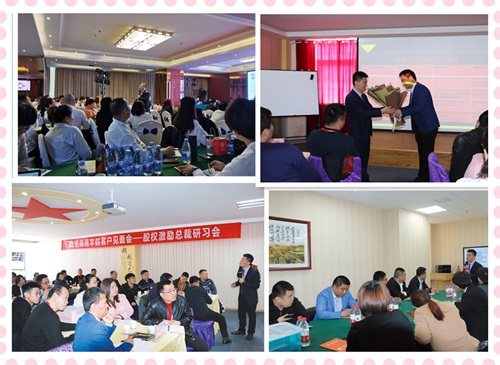

公司動態(tài)
股權(quán)激勵Equity incentive
家族企業(yè)股權(quán)結(jié)構(gòu)設(shè)計應(yīng)注意的問題
發(fā)布時間:2024-04-28 來源:http://zyvd.cn/
初代企業(yè)家們創(chuàng)造了自己的商業(yè)碩果,積累了一定規(guī)模的企業(yè)與家族財富,,但一代人的時光之后,,如何完成家族企業(yè)間的代際傳承,成了備受關(guān)注的話題,。
The first generation of entrepreneurs created their own business achievements and accumulated a certain scale of enterprise and family wealth, but after a generation, how to complete the intergenerational inheritance of family businesses has become a topic of great concern.
根據(jù)相關(guān)數(shù)據(jù)調(diào)查顯示,,只有30%的家族企業(yè)能夠延續(xù)到第二代,只有10%的家族企業(yè)可以傳承到家族第三代,。在被調(diào)查的企業(yè)家中,,超過90%希望“讓子女接班管理本企業(yè)”,而其子女有接班意原的僅占35%,。家族企業(yè)代際傳承之難可見一斑,。
According to relevant data surveys, only 30% of family businesses can continue to the second generation, and only 10% of family businesses can be passed down to the third generation. Among the surveyed entrepreneurs, over 90% hope to have their children take over the management of the company, while only 35% of their children have the intention to take over. The difficulty of intergenerational inheritance in family businesses is evident.
股權(quán)設(shè)計不合理
Unreasonable equity design
家族企業(yè)代際傳承面臨的風(fēng)險
The risks faced by intergenerational inheritance of family businesses
目前,我國有相當(dāng)規(guī)模的家族企業(yè)正面臨著交接班的問題,從企業(yè)層面進行家族傳承時,,最關(guān)鍵的便是股權(quán)架構(gòu)的設(shè)計,。
At present, a considerable number of family owned enterprises in China are facing the problem of handover. When carrying out family inheritance at the enterprise level, the most crucial aspect is the design of equity structure.
但當(dāng)家族企業(yè)進行代際傳承時,繼承人未必能很好地處理公司業(yè)務(wù)和家族成員之間的復(fù)雜關(guān)系,,且股權(quán)設(shè)計設(shè)計不合理的情況下,,家族企業(yè)傳承將面臨很大風(fēng)險。
But when family businesses carry out intergenerational inheritance, the inheritors may not be able to handle the complex relationships between the company's business and family members well, and if the equity design is unreasonable, the inheritance of family businesses will face great risks.
風(fēng)險一:股權(quán)均分
Risk 1: Equal distribution of equity
部分家族企業(yè),,在二代接班的時候,,會出現(xiàn)多個繼承人的情況,初代企業(yè)家如果維持“一碗水端平”的家庭理念,,給繼承人們均分股權(quán),,將會導(dǎo)致企業(yè)控制權(quán)分散,缺乏一錘定音的“家族頭人”,。后續(xù)一旦繼承人間經(jīng)營理念出現(xiàn)差異,,容易形成公司“難以決策或無任擔(dān)責(zé)”的僵化局面,甚至繼承人間出現(xiàn)兄弟反目,、搶班奪權(quán)的情況,。此時,將嚴(yán)重阻礙公司的發(fā)展,,甚至關(guān)門倒閉,。
In some family businesses, when the second generation takes over, there may be multiple heirs. If the first generation of entrepreneurs maintain the family philosophy of "a bowl of water is even" and divide the shares equally among the heirs, it will lead to the dispersion of corporate control and the lack of a definitive "family leader". Once there are differences in the management philosophy among the inheritors in the future, it is easy to form a rigid situation where the company is "difficult to make decisions or irresponsible", and even there may be sibling conflicts and power grabbing among the inheritors. At this point, it will seriously hinder the development of the company, and even close down and go bankrupt.
?如曾經(jīng)的醬油之王楊協(xié)成家族是比較典型的案例。1956年,,家族管理人楊天恩將醬油廠資產(chǎn)分成七份,,分別由家族兄弟五人和子孫兩人獲得。然而,,隨著企業(yè)的不斷發(fā)展壯大,,楊氏家族內(nèi)部開始不斷就投資決策爭吵,管理理念出現(xiàn)重大分歧,。盡管楊協(xié)成采用集體決策手段救濟,,但由于家庭成員越來越多,再加上當(dāng)時的主席兼總裁楊至耀不斷掣肘,,無法有效管理,,決策十分困難。直至1994年,,楊志耀向法院申請解散楊協(xié)成公司,。
? The Yang Xiecheng family, the former king of soy sauce, is a typical case. In 1956, the family manager Yang Tianen divided the assets of the soy sauce factory into seven parts, which were obtained by the five brothers and two descendants of the family. However, with the continuous development and growth of the enterprise, the Yang family began to constantly argue about investment decisions and significant differences in management concepts. Although Yang Xiecheng used collective decision-making methods to provide relief, due to the increasing number of family members and the constant constraints of the then chairman and CEO Yang Zhiyao, effective management was unable to be achieved, making decision-making extremely difficult. Until 1994, Yang Zhiyao applied to the court to dissolve Yang Xiecheng Company.
風(fēng)險二:沒有設(shè)計股權(quán)防火墻,財產(chǎn)安全面臨風(fēng)險
Risk 2: Failure to design equity firewall poses a risk to property security
大多數(shù)初代企業(yè)家在創(chuàng)業(yè)時,,不了解企業(yè)股權(quán)設(shè)計,,股權(quán)結(jié)構(gòu)相對單一,。許多成立一人有限責(zé)任公司的,不能證明公司財產(chǎn)獨立于自身財產(chǎn)的(實際上很難證明),,應(yīng)對公司債務(wù)承擔(dān)連帶責(zé)任,;許多由自然人直接持股,沒有設(shè)計股權(quán)防火墻,,自然人作為股東直接持股的風(fēng)險極大,。
Most first generation entrepreneurs are not familiar with the design of corporate equity when starting a business, and their equity structure is relatively single. Many individuals who establish a one person limited liability company cannot prove that the company's assets are independent of their own (which is actually difficult to prove) and should bear joint and several liability for the company's debts; Many are directly held by natural persons without a designed equity firewall, and the risk of natural persons holding shares directly as shareholders is extremely high.
?如在港上市的富貴鳥執(zhí)行董事林國強去世,因為沒有設(shè)計完善的股權(quán)防火墻,,林國強子女為了避免林國強的高額債務(wù)而放棄了遺產(chǎn)繼承權(quán),。原因是,銀行正在起訴林氏兄弟和富貴鳥集團,,富貴鳥集團與農(nóng)業(yè)銀行石獅支行的借款合同中,,林國強簽字擔(dān)保人,因此林國強去世后,,銀行提出訴訟請求,要求追究其配偶及子女作為第一順位繼承人,,在繼承遺產(chǎn)范圍內(nèi)承擔(dān)連帶清償責(zé)任,。于是林國強子女未來規(guī)避巨額債務(wù),不得不選擇方起繼承權(quán),。
? Lin Guoqiang, the executive director of Fuguiniao listed in Hong Kong, passed away due to the lack of a well-designed equity firewall. Lin Guoqiang's children abandoned their inheritance rights in order to avoid Lin Guoqiang's high debts. The reason is that the bank is suing the Lin brothers and Fuguiniao Group. In the loan contract between Fuguiniao Group and Agricultural Bank of China Shishi Branch, Lin Guoqiang signed as a guarantor. Therefore, after Lin Guoqiang's death, the bank filed a lawsuit requesting that his spouse and children be held as the first in line heirs and bear joint and several liability within the scope of inheritance. So Lin Guoqiang's children had to choose Fang Qi's inheritance rights to avoid huge debts in the future.
風(fēng)險三:股權(quán)高度分散,,導(dǎo)致外部干擾增大
Risk 3: Highly dispersed equity, leading to increased external interference
家族成員因婚姻變故及多代繼承等原因?qū)е录易迤髽I(yè)股權(quán)結(jié)構(gòu)不斷被分散、外流,。長期以往,,將導(dǎo)致股權(quán)結(jié)構(gòu)發(fā)生巨大變化。這樣公司容易受外部某些不理想股東的影響和操控,,不利于家族對企業(yè)的控制力,,難以實現(xiàn)企業(yè)的長期價值。
Due to changes in marriage and multiple generations of inheritance, family members have led to the continuous dispersion and outflow of equity structure in family businesses. In the long run, it will lead to significant changes in the equity structure. This way, the company is easily influenced and manipulated by some unfavorable external shareholders, which is not conducive to the family's control over the enterprise and makes it difficult to achieve the long-term value of the enterprise.
風(fēng)險四:家族資產(chǎn)過度集中,,沒有預(yù)留股權(quán)給職業(yè)經(jīng)理人,、專業(yè)的管理人才
Risk 4: Excessive concentration of family assets and failure to reserve equity for professional managers and management talents
根據(jù)相關(guān)數(shù)據(jù)調(diào)查,很多二代并不愿意接手上一輩的企業(yè)管理工作,。此時企業(yè)若沒有預(yù)留股權(quán)給職業(yè)經(jīng)理人,、專業(yè)的管理人,便很難吸引到優(yōu)秀的人才進行公司管理,。要求能力不足的二代強行上崗,,最終也可能導(dǎo)致企業(yè)業(yè)績一落千丈,面臨極大的損失風(fēng)險,。
According to relevant data surveys, many second-generation individuals are unwilling to take over the management work of the previous generation. At this time, if a company does not reserve equity for professional managers or professional managers, it is difficult to attract outstanding talents for company management. Forcing the second generation with insufficient abilities to take up positions may ultimately lead to a sharp decline in business performance and face significant risk of loss.
無論接班與否,,股權(quán)激勵實施是不可忽視的大事,,資本和人才對企業(yè)發(fā)展都是至關(guān)重要的經(jīng)營要素,股權(quán)激勵才能充分調(diào)動核心經(jīng)營人員積極性,,資本股和人力股是要家族企業(yè)需要充分考慮并提前做出規(guī)劃,。
Whether taking over or not, the implementation of equity incentives is an important matter that cannot be ignored. Capital and talent are crucial business elements for the development of enterprises, and equity incentives can fully mobilize the enthusiasm of core business personnel. Capital and human resources stocks need to be fully considered and planned in advance by family businesses.
家族企業(yè)傳承
Family business inheritance
該如何進行股權(quán)設(shè)計?
How to carry out equity design?
家族成員的貢獻與角色:股權(quán)分配應(yīng)基于家族成員對企業(yè)的實際貢獻,、投入的資源以及在企業(yè)中的角色,。例如,,如果某個家族成員在企業(yè)中擔(dān)任重要職務(wù)并做出了顯著貢獻,,他/她應(yīng)獲得相應(yīng)的股權(quán)份額。

The contribution and role of family members: Equity distribution should be based on the actual contribution of family members to the enterprise, the resources invested, and their roles in the enterprise. For example, if a family member holds an important position in a company and makes significant contributions, he/she should receive the corresponding equity share.
公平與公正:股權(quán)結(jié)構(gòu)的設(shè)計應(yīng)遵循公平和公正的原則,,避免引發(fā)家族成員之間的不公平感和矛盾,。這需要充分考慮每個家族成員的權(quán)益,,確保他們在企業(yè)中的利益得到合理保障。
Fairness and impartiality: The design of equity structure should follow the principles of fairness and impartiality to avoid causing unfairness and conflicts among family members. This requires full consideration of the rights and interests of each family member to ensure that their interests in the enterprise are reasonably protected.
企業(yè)發(fā)展戰(zhàn)略:股權(quán)結(jié)構(gòu)應(yīng)與企業(yè)的發(fā)展戰(zhàn)略相契合,。如果企業(yè)計劃在未來進行擴張,、并購或上市,那么股權(quán)結(jié)構(gòu)需要能夠適應(yīng)這些變化,,并為企業(yè)的長期發(fā)展提供有力支持,。
Enterprise development strategy: The equity structure should be aligned with the company's development strategy. If a company plans to expand, acquire, or go public in the future, its equity structure needs to be able to adapt to these changes and provide strong support for the long-term development of the company.
風(fēng)險控制與隔離:在設(shè)計股權(quán)結(jié)構(gòu)時,需要考慮風(fēng)險隔離的原則,,即實現(xiàn)企業(yè)風(fēng)險與股東個人風(fēng)險的相互隔離,。這有助于保護家族成員的個人財產(chǎn)安全,防止因企業(yè)風(fēng)險而影響到家族財富,。
Risk control and isolation: When designing equity structures, it is necessary to consider the principle of risk isolation, which is to achieve mutual isolation between enterprise risks and individual shareholder risks. This helps to protect the personal property safety of family members and prevent the impact of business risks on family wealth.
傳承規(guī)劃:對于家族企業(yè)而言,,傳承規(guī)劃是一個不可忽視的問題。在股權(quán)結(jié)構(gòu)設(shè)計中,,需要考慮如何確保企業(yè)的順利傳承,,包括培養(yǎng)后繼人才、設(shè)立特殊的股權(quán)或信托機制等,。
Inheritance planning: For family businesses, inheritance planning is an issue that cannot be ignored. In the design of equity structure, it is necessary to consider how to ensure the smooth inheritance of the enterprise, including cultivating successors, establishing special equity or trust mechanisms, etc.
稅務(wù)與法律合規(guī):股權(quán)結(jié)構(gòu)的設(shè)計還需要考慮稅務(wù)和法律合規(guī)的問題,。企業(yè)應(yīng)確保股權(quán)結(jié)構(gòu)符合相關(guān)稅法規(guī)定,避免因稅務(wù)問題而引發(fā)不必要的法律風(fēng)險,。
Tax and Legal Compliance: The design of equity structure also needs to consider tax and legal compliance issues. Enterprises should ensure that their equity structure complies with relevant tax laws and regulations to avoid unnecessary legal risks caused by tax issues.
家族文化與價值觀:家族企業(yè)的股權(quán)結(jié)構(gòu)也應(yīng)體現(xiàn)家族的文化和價值觀,。這有助于增強家族成員的歸屬感和凝聚力,促進企業(yè)的穩(wěn)定發(fā)展,。
Family culture and values: The equity structure of a family business should also reflect the family's culture and values. This helps to enhance the sense of belonging and cohesion of family members, and promotes the stable development of the enterprise.
本站聲明
本網(wǎng)站為非營利性網(wǎng)站,,旨在宣揚股權(quán)知識,,交流職業(yè)學(xué)習(xí)心得。網(wǎng)站內(nèi)部分文章來自其它網(wǎng)站,,只做交流學(xué)習(xí)之用,。相應(yīng)的權(quán)力均屬于原權(quán) 力人,如權(quán)利人認(rèn)為不妥,,請來電來函說明,,本網(wǎng)站隨既停止或使用,謝謝合作,! 13698613138
13698613138
微信公眾號

掃碼獲知更多知識

抖音二維碼
山東股章企業(yè)管理顧問有限公司 備案號:魯ICP備19050574號-2 網(wǎng)站建設(shè)·推廣運營 網(wǎng)站地圖 XML TXT

截屏,,微信識別二維碼